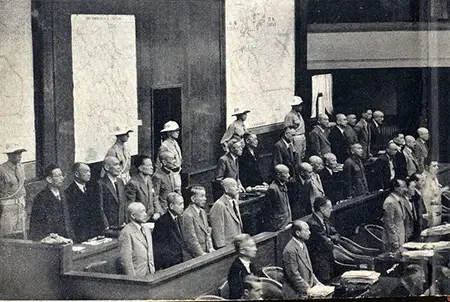War Crimes Trials
After World War II came to an end, the Allies, including America, the Soviet Union and Great Britain wanted to punish those who started and planned the war. The Allies wanted to put German and Japanese war leaders on trial for these ‘crimes against peace’.
War crimes were acts that went beyond levels of respectful behaviour even at a time of war. There are certain laws of war. For example, not bombing cities and towns without military goals, torturing, starving, murdering prisoners of war, or carrying out other cruel acts that could never be acceptable even in the most terrible wars.
The other reasons for the trials were ‘crimes against humanity’. This meant inhumane acts against ordinary people sometimes based on their political, religious or racial background.


The Nuremberg Trials
The trials took place in the German city of Nuremberg between 1945 and 1949. The city of Nuremberg was chosen because it was once the place where the Nazis held mass rallies. By having the trials at this location, it emphasised the total defeat of everything the Nazis had stood for.
The main individuals on trial were Nazi Party leaders and military commanders, including Hermann Goering, Rudolph Hess, Joachim von Ribbentrop, Alfred Rosenberg, and Albert Speer. Other influential people who took active part in the crimes, such as businessmen, doctors and lawyers were also tried in the second part of the trial.
Hitler and two of his close friends, Heinrich Himmler and Joseph Goebbels, all committed suicide in the spring of 1945 when they knew the war was lost before they could be brought to trial.
The Nuremberg tribunal found nineteen people guilty and those individuals were sentenced to different punishments, including death by hanging and long prison sentences. Only three defendants were found not guilty, Hermann Goering committed suicide prior to trial.

Other important trials
The Tokyo War Crimes Trials took place between May 1946 and November 1948. As in Nuremberg, the main defendants of this trial were senior Japanese political and military figures. Seven Japanese commanders were sentenced to death by hanging, others were sent to prison.
But the Allies decided not to put Emperor Hirohito on trial. Although many felt that he was guilty, the Americans believed that he would help to stabilise a more liberal new Japan after the war.
There were many other trials apart from those at Nuremberg and Tokyo. Many of these took place in Poland and Germany just after the war to prosecute those involved in the running of the Nazi camps.
Other trials took place in Romania, Hungary, Bulgaria, Finland and Czechoslovakia to punish war crimes in those countries.
Further trials against the Japanese took place in China through the Nanjing War Crimes Tribunal, which put the accused on trial for the mass killing of ordinary Chinese people and soldiers. The Americans held trials at Yokohama and Manila against Japanese war criminals guilty of many terrible acts.

Why were the trials so important?
These trials were important learning experiences for human beings. The crimes of World War II had been so terrible that the world was in a state of shock by the end of the conflict. The trials, although far from perfect, still helped establish the basis for decent human behaviour during wartime.
They led to the establishment of international laws to make it clear that some of the crimes should never happen again. For instance, Nuremberg led to the creation of the Universal Declaration of Human Rights in 1948. This aimed to make people work together and cooperate, to respect one another and their rights to a decent life, free from discrimination.
The Geneva Convention on the Laws and Customs of War was also renewed in 1949. It aims to protect ordinary people in times of war who are not involved in conflict. In addition to civilians, these laws protected sick and wounded soldiers and sea personnel, as well as prisoners of war.
Sadly, there have been harsh wars since World War II, in countries, such as the former Yugoslavia in 1993 and in Rwanda in 1994. But after the experiences of Nuremberg and the other trials, humanity is now better prepared to deal with these events.



